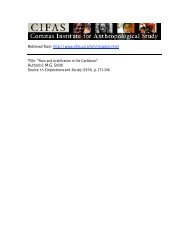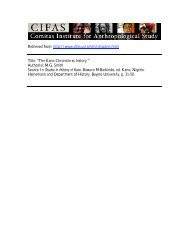e - CIFAS
e - CIFAS
e - CIFAS
You also want an ePaper? Increase the reach of your titles
YUMPU automatically turns print PDFs into web optimized ePapers that Google loves.
,<br />
~<br />
68 GOVERNMENT IN ZAZZAU<br />
(a) BUTeaucrary at Ahuja<br />
At first glance, the system of government at Ahuja may seem to<br />
approximate closely to Max Weber's ideal-type of 'traditional<br />
authority'l; but here also there are significant differences, and<br />
these have certain theoretical implications.<br />
In an especially interesting passage, Weber compares traditional<br />
and bureaucratic administrations, and relates them developmentally.<br />
'Bureaucracy first developed in patrimonial states. with a body of<br />
officials recruited from extra-patrimonial sources; but. as will be<br />
shown presently, these "officials" have originally been personal followers<br />
of the chief. In the pure type of traditional authority, the<br />
following features of a bureaucracy are absent: (a) a clearly defined<br />
sphere of competence subject to impersonal rules; (b) a rational<br />
ordering of relations of superiority and inferiority; (c) a regular<br />
system of appointment and promotion on the basis of free contract:<br />
(d) technical training as a regular requirement; (e) fixed salaries, in<br />
the type case paid in money. In place of a well-defined impersonal<br />
sphere of competence, there is (in traditional systems of authority)<br />
a shifting series of tasks and powers commissioned and granted by<br />
the chiefthrough his arbitrary decision of the moment. An important<br />
influence is exerted by competition for sources of income and advantage<br />
which are at the disposal of persons acting on behalf of the<br />
chief or of the chief himself. It is often in the first instance through<br />
these interests that definite functional spheres are marked off, and<br />
with them definite administrative organs.>ll<br />
Several elements of this definition, such as rationality and impersonality,<br />
are unsatisfactory because of their imprecision and<br />
normative qualities. Such tenus imply scales, in terms of which<br />
some systems of rules are more 'rational' than others, and some<br />
patterns of r,elations are more 'impersonal'. But as regards the<br />
relative rationality of systems of rules, it is surely necessary to have<br />
precise criteria; rules which are quite 'rational' or instrumental<br />
with respect to one set of objects may be quite irrational or unserviceable<br />
with regard to another. s Likewise, with regards to the<br />
impersonality of relational structures, care must be taken to distinguish<br />
and include the informal and the formal aspects of such<br />
structures. Itis quite conceivablethat a formally impersonal system<br />
I Weber, op. cit., pp. 313-29. I Ibid., p. 31S_ I Ibid., pp. 33~ 312.





